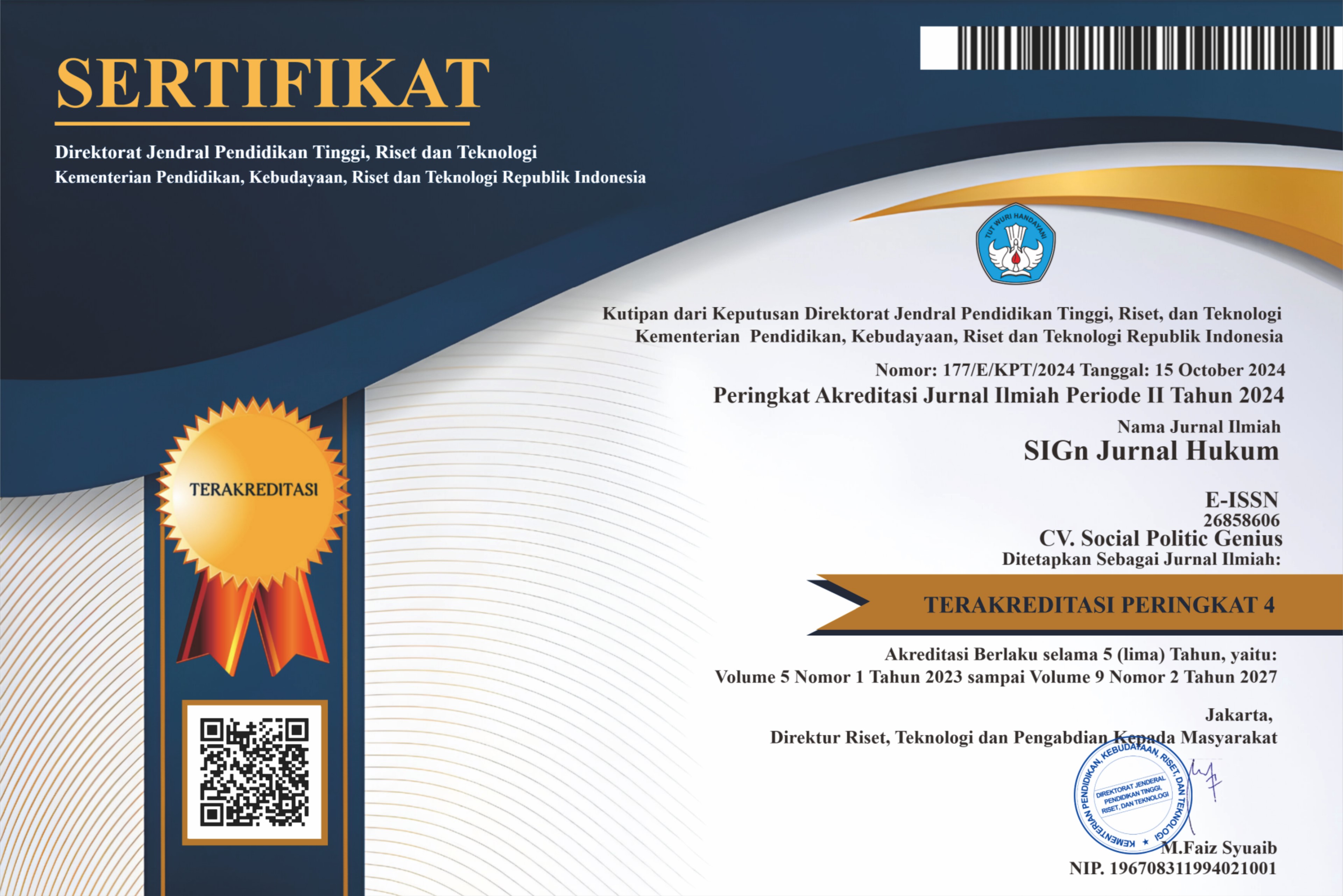The Dialectic of Ishlah Principle: Contextualizing Reconciliation on the Dominant Factors of Divorce
Abstract
The uniform application of mediation in divorce cases in Indonesia has proven unevenly effective, particularly when confronted with conflicts that undermine the essence of marriage, the sacred covenant (mitsaqan ghalizhan), such as domestic violence. Addressing this problem, this study critically analyses the dialectic between the imperative of the Reconciliation principle (ishlah) and the heterogeneity of factors that cause divorce. Employing a normative-qualitative legal research method and an Islamic legal philosophy approach, this study operationalizes the framework of the higher objectives of shari’ah (maqasid al-shari’ah) as its primary analytical tool. The findings reveal an apparent dichotomy. Mediation holds potential for success in functional-relational conflicts, such as economic factors and persistent disputes (syiqaq). However, it proves ineffective and philosophically inappropriate in cases of fundamental violations like domestic violence and infidelity, as it contradicts the objective of the preservation of life (hifz al-nafs). This research concludes that the paradigm of success in mediation must be reconceptualized. It must shift from merely achieving a formal marital reunion (rujuk) to realizing an amicable divorce (tasrihun bi ihsan), wherein a peaceful agreement on post-divorce rights becomes the primary metric. Therefore, the development of conflict typology-based mediation guidelines is recommended to align legal practice with substantive justice.
Downloads
References
Amadea, N., Nasution, F. U., & Putri, S. A. (2022). The Appointing of a Legal Guardian based on Audi et Alteram Partem Principle and Only One Guardian Principle. SIGn Jurnal Hukum, 4(1), 124-139. https://doi.org/10.37276/sjh.v4i1.185
Fahrurrozi, F., Apipuddin, A., & Sunardi, H. (2022). Penyelesaian Kasus KDRT Menggunakan Restoratif Justice Perspektif Maqashid Syari’ah (Studi Kasus di Kepolisian Resort Kota Mataram). Al-Ihkam: Jurnal Hukum Keluarga Jurusan Ahwal Al-Syakhshiyyah Fakultas Syariah IAIN Mataram, 14(2), 201-222. https://doi.org/10.20414/alihkam.v14i2.6929
Gadjong, A. A. (2023). Legal Consequences of Violating the Endogamy Marriage System in Indonesia: A Study of Legislation. SIGn Jurnal Hukum, 5(1), 141-154. https://doi.org/10.37276/sjh.v5i1.229
Haeratun, H., & Fatahullah, F. (2022). Efektivitas Mediasi Sebagai Alternatif Penyelesaian Perkara Perceraian di Pengadilan Agama. Batulis Civil Law Review, 3(1), 29-59. https://doi.org/10.47268/ballrev.v3i1.930
Harjianto, H., & Jannah, R. (2019). Identifikasi Faktor Penyebab Perceraian Sebagai Dasar Konsep Pendidikan Pranikah di Kabupaten Banyuwangi. Jurnal Ilmiah Universitas Batanghari Jambi, 19(1), 35-41. https://doi.org/10.33087/jiubj.v19i1.541
Hartawati, A., Beddu, S., & Susanti, E. (2022). Model Mediasi dalam Meningkatkan Keberhasilan Penyelesaian Perkara Perceraian di Pengadilan Agama. Indonesian Journal of Criminal Law, 4(1), 59-73. Retrieved from https://journal.ilininstitute.com/index.php/ijocl/article/view/1551
Iberahim, I., Akil, M., & Hasriani, A. (2023). Strategi Mediator pada Tingkat Keberhasilan Mediasi dalam Perkara Perceraian. Qanun: Journal of Islamic Laws and Studies, 2(1), 45-49. https://doi.org/10.58738/qanun.v2i1.286
Irwansyah. (2020). Penelitian Hukum: Pilihan Metode & Praktik Penulisan Artikel. Mirra Buana Media.
Lajnah Pentashihan Mushaf Al-Qur’an. (2022). Qur’an Kemenag. Ministry of Religious Affairs of the Republic of Indonesia. https://quran.kemenag.go.id
Law of the Republic of Indonesia Number 1 of 1974 on Marriage (State Gazette of the Republic of Indonesia of 1974 Number 1, Supplement to the State Gazette of the Republic of Indonesia Number 3019). https://www.dpr.go.id/dokumen/jdih/undang-undang/detail/742
Law of the Republic of Indonesia Number 16 of 2019 on Amendment to Law Number 1 of 1974 on Marriage (State Gazette of the Republic of Indonesia of 2019 Number 186, Supplement to the State Gazette of the Republic of Indonesia Number 6401). https://www.dpr.go.id/dokumen/jdih/undang-undang/detail/1753
Lira, M. A. (2023). The Father’s Responsibility for the Fulfillment of Child Support Post-Divorce. SIGn Jurnal Hukum, 5(2), 276-291. https://doi.org/10.37276/sjh.v5i2.291
Mangarengi, A. A., & Hamzah, Y. A. (2021). The Position of the Marriage Law on Interfaith Marriages Abroad. SIGn Jurnal Hukum, 3(1), 65-83. https://doi.org/10.37276/sjh.v3i1.127
Mulyana, A. A., & Irwan, I. (2025). The Role of the PKK of Medan City to Preventing Domestic Violence in Perspective of Law Number 23 of 2004. SIGn Jurnal Hukum, 7(1), 248-262. https://doi.org/10.37276/sjh.v7i1.448
Musawwamah, S. (2022). Divorcing Husbands as a Solution to Protect Women’s Dignity: A Case Study of Domestic Violence at Madura Religious Court. Samarah: Jurnal Hukum Keluarga dan Hukum Islam, 6(2), 997-1021. https://doi.org/10.22373/sjhk.v6i2.14929
Nugraha, A., Barinong, A., & Zainuddin, Z. (2020). Faktor Penyebab Terjadinya Perceraian Rumah Tangga Akibat Perselingkuhan. Kalabbirang Law Journal, 2(1), 53-68. https://doi.org/10.35877/454RI.kalabbirang30
Presidential Instruction of the Republic of Indonesia Number 1 of 1991 on Spread of the Compilation of Islamic Law. https://peraturan.bpk.go.id/Details/293351/inpres-no-1-tahun-1991
Purwadi, W. (2021). Analisis Efektivitas Mediasi pada Cerai Talak dan Cerai Gugat di Pengadilan Agama Manado. Al-Mujtahid: Journal of Islamic Family Law, 1(1), 36-49. https://doi.org/10.30984/jifl.v1i1.1638
Qamar, N., & Rezah, F. S. (2020). Metode Penelitian Hukum: Doktrinal dan Non-Doktrinal. CV. Social Politic Genius (SIGn).
Regulation of the Supreme Court of the Republic of Indonesia Number 1 of 2016 on Mediation Procedures in the Court (Bulletin Gazette of the Republic of Indonesia of 2016 Number 175). https://peraturan.go.id/id/peraturan-ma-no-1-tahun-2016
Rimi, A. M. (2023). The Position of Premarital Property and Joint Property after Divorce: A Study of Premarital Agreement. SIGn Jurnal Hukum, 4(2), 376-387. https://doi.org/10.37276/sjh.v4i2.226
Saifullah, M. (2015). Efektivitas Mediasi dalam Penyelesaian Perkara Perceraian di Pengadilan Agama Jawa Tengah. Al-Ahkam, 25(2), 181-204. https://doi.org/10.21580/ahkam.2015.25.2.601
Sampara, S., & Husen, L. O. (2016). Metode Penelitian Hukum. Kretakupa Print.
Tirtawening, T., & Maryam, R. (2018). The Urgency of Applying Domestic Violence Screening Mechanism for Divorce Mediation in Religious Court. Mimbar Hukum, 30(1), 138-152. https://doi.org/10.22146/jmh.28713
Zakih, M. (2024). Pengaruh Faktor Ekonomi dalam Kasus Perceraian Terhadap Putusan Pengadilan Agama di Jember (Studi Kasus Putusan PA Jember Nomor 4318/Pdt.G/2023/PA.Jr.). Jurnal Cahaya Mandalika, 5(2), 953-964. Retrieved from https://www.ojs.cahayamandalika.com/index.php/jcm/article/view/3790
Zulkfa, M. K. (2021). Kegagalan dan Keberhasilan Mediasi dalam Penyelesaian Perkara Perceraian di Pengadilan Agama Kajen Tahun 2017. Al-Hukkam: Journal of Islamic Family Law, 1(1), 37-52. Retrieved from https://e-journal.uingusdur.ac.id/al-hukkam/article/view/252
Copyright (c) 2025 Dinaryati Rahim

This work is licensed under a Creative Commons Attribution 4.0 International License.

















